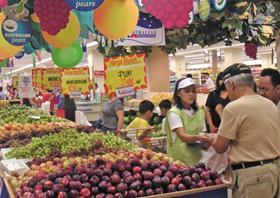
The fresh fruit trade into Indonesia remains fraught with challenges under the country’s new import regulations, despite some reports that fresh import quotas have been issued.
Under the rules, which took effect in the last quarter of 2012, all importers were required to submit planned estimates for all the fruits they intended to bring in under an import quota system.
An initial quota, issued in September, is due to expire at the end of February, while the situation with regard to the second quota remains murky.
“My information is no quota has been issued for the arrival of products after February,” Tim Nethersole of Australian-based exporter V19 Fresh Fruit told Asiafruit.
“It means our exports to Indonesia are all over for now, this is probably the last week the can be sent to arrive before the end of February.”
Neil Barker of BGP International, another Australian-based exporter that sources products from a range of global sources, said that new quotas had been issued earlier this week, allowing it to begin shipping Pakistani kinnow mandarins to Indonesia.
“We had a lot of problems getting a quota for mandarins from Pakistan but we got the clearance one this week, so we’ve started shipping,” he said. “We’re also been shipping Egyptian citrus into Indonesia and people seem to be getting quotas. It’s not easy but it can be done.”
While trade was continuing, Barker said that the new regulations were making it challenging. “The whole process is really time consuming,” he said. “The importers don’t order until they get a quota; they have to order on the basis they will get one. Then they have to sit on the order until they get the certification from SGS.”
The Indonesian government has defended the regulations, suggesting they are a crucial step in ensuring the future of the country’s own produce industry.
“We must give protection to our farmers, because it is linked with the prosperity of many people,” Indonesia’s coordinating minister for economy, Hatta Rajasa told inilah.com.
“We also face difficulty in exporting our products.
“So should we give protection to our farmers, what's wrong with that?”
Last month the US government requested consultations with the World Trade Organization (WTO) to address issues arising from the regulations.
US trade representative Ron Kirk said the regulations non-automatic licensing system was a breach of Indonesia’s commitments to the WTO.
“Indonesia’s opaque and complex import licensing system affects a wide range of American agricultural exports,” Kirk said.
“It has become a serious impediment to US agricultural exports entering Indonesia, reducing Indonesian consumers' access to high-quality US products.”
In late January, six Taiwanese fruit products were banned from entering Indonesia for six months.
In what the Indonesian government described as a protective measure for the country’s growers, the importation of Taiwanese durians, pineapples, melons, bananas, mangos and papayas were stopped until the end of June.
The six products make up the bulk of Taiwan's South East Asian exports.



